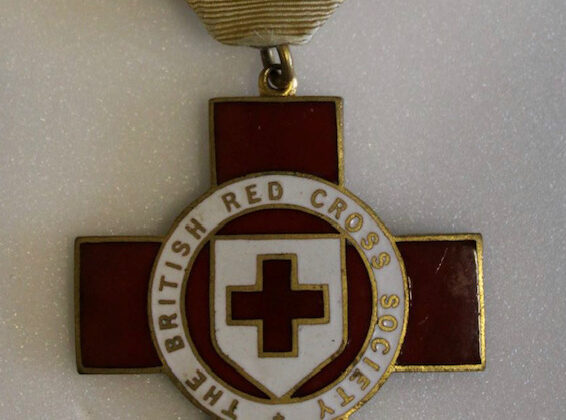International Women’s Day
In celebration of International Women’s Day, this week’s artefact is a medal awarded to Emily Stooke – a Red Cross volunteer nurse in the First World War. The role of women prior to being able to serve in the armed forces was vital in roles which supported soldiers and kept industry alive. With medical practitioners stretched amongst military hospitals and caring for frontline soldiers in field hospitals, the treatment of wounded soldiers relied heavily on the trained nurses who remained in Britain and a new workforce of volunteers prepared to learn on the job. County branches of the Red Cross had their own volunteers known as the Voluntary Aid Detachment or VADs. Members of these groups were trained in first aid and home nursing by medical practitioners to volunteer in auxiliary hospitals, Emily Stooke was one of these volunteers. Anyone between 23 and 38 years old was able to sign up to be a VAD, whether that was in the role of a nurse in an auxiliary hospital or carrying out transport duties. By 1918 there were over 90,000 VADs.
First World War
At the outbreak of the First World War, the British Red Cross and the Order of St John of Jerusalem combined to form the Joint War Committee. The Red Cross set up temporary hospitals known as auxiliary hospitals with their access to buildings, equipment and staff to accommodate wounded men arriving from abroad. As well as working alongside trained nurses in auxiliary hospital settings, in February 1915 the War Office proposed that volunteers could help at Military Royal Army Medical Corps (RAMC) hospitals which had previously been staffed exclusively by army nurses and orderlies from the RAMC.
Emily Stooke, Voluntary Aid Detachment
Emily Stooke served as a VAD between 1915-1918, working 31 hours a week. She worked at three auxiliary hospitals across Devon all set up in houses on large estates in Salcombe, Yealhmpton and Plympton. Mr and Mrs Vereker built a grand house in Sharpitor with 6-acre gardens in 1913, now known as Overbecks and maintained by the National Trust. They offered their space to the Red Cross to be used as the auxiliary hospital ‘Salcombe V.A Hospital’. Their second son, second lieutenant Robert Vereker, 2nd Battalion of the Grenadier Guards, died in battle at Mons, Belgium only 22 days into the war – fuelling their determination to utilise their newly built house to care for soldiers like their late son. The hospital closed in 1919 with over 1010 wounded soldiers passing through and no deaths as a result of the care given by VAD’s such as Emily Stooke. This medal for ‘Proficiency in Red Cross first aid’ was awarded to Emily Stooke by The British Red Cross Society. Emily would have had to gain three certificates in subjects such as nursing, hygiene and sanitation, and first aid over three years in order to be presented with this medal. With these qualifications, partially trained VADs like Emily, were despatched to France, Belgium, Serbia and Gallipoli to assist trained nurses in caregiving in areas of hostility.


Proficiency in Red Cross First Aid’ Medal awarded to Emily Stooke (Back)

